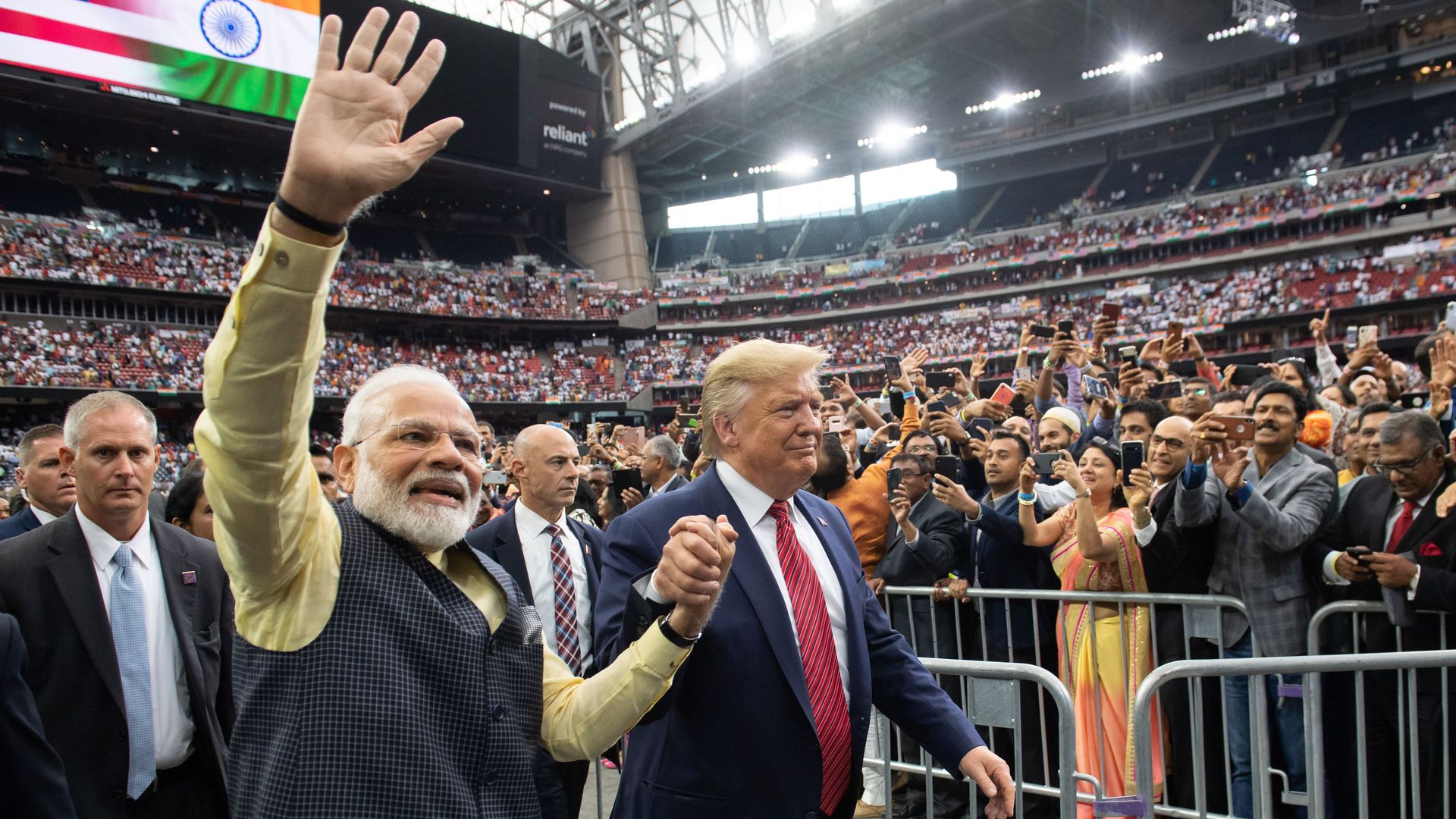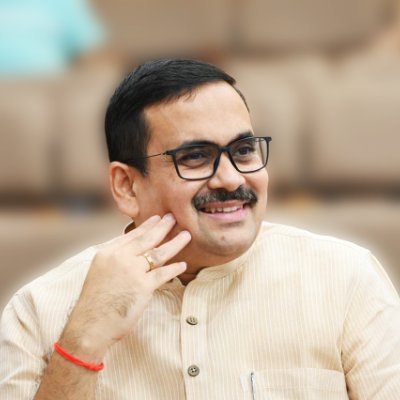Different dimensions emanated from Houston’s Howdy Modi event, collectively affirming India’s role as a responsible global power in shaping the new world order
The historic Howdy Modi event in Houston and the Modi-Trump meeting and show of solidarity at the mega event in NRG stadium had different dimensions of symbolism to it. Trump’s declaration that the United States was “committed to protecting innocent Indian-Americans from the threat of radical Islamic terrorism”, received a standing ovation from the audience. It was a major boost to India’s own stand against terrorism, especially terror networks and modules emanating from her neighbourhood. This was one major symbolism, that the fight against terror will henceforth be a joint fight.
Prime Minister Modi’s clear articulation that perpetrators of 9/11 and 26/11 had the same source, same origin, same masters and same benefactors, further bolstered his repeated argument on every multilateral forum that there can be no false distinction between “good and bad terrorism”. Modi’s reiteration coming just before the UNGA at such a public event also indicates that the world is now veering round to a consensus on the major source of international terrorism – the ideological as well as the material source. Except perhaps for China, which has displayed a public reluctance to call out
Pakistan on its role in promoting terror groups, except for a few motivated and agenda-driven human rights body and entities who have repeatedly kept silent on terror outrages and violation of human rights by terror outfits, there is an emerging understanding of the role that a failing state like Pakistan plays in injecting instability across the world.
The other message that got the 50,000-plus audience on its feet was PM Modi’s point that Article 370 was given a farewell. Its doing away had heralded a new dawn for people of Jammu-Kashmir and Ladakh, he pointed out. The overwhelming support that this received from Indians gathered at the NRG stadium, extended the domestic support of the issue among NRIs. This happened in the presence of the US president representing the US administration, and PM Modi, by clearly emphasising the role of the Indian Parliament on the abrogation of Article 370 – the two-day-long debates that Parliament witnessed, the support that the move received across the political spectrum, underlining the fact that his party did not have the requisite numbers in the Upper House – and by calling upon all those who had gathered to give a standing ovation to the Indian Parliament and its parliamentarians, underlined and reiterated the fact that the move was an entirely democratic, parliament deliberated and ratified move, which was completely internal to India’s democratic system. It reinforced the point that the move had the support of Indian lawmakers and will therefore never be on an international high-table for discussion or debate.
Non-democratic societies and partisan international agencies, who have made a business out of human rights will continue to be incapable of appreciating this part of the entire exercise. President Trump and his advisors and the larger US intelligentsia would have absorbed the message. The fact that PM Modi had India and Indians behind him in this historic act was evident but Houston proved that the India diaspora was with him as well.
The all-out attempts of the Pakistani lobbies, of the Khalistani and ISI propaganda fronts, and the foreign units of the “Tukde-Tukde Gangs” and the “Urban Naxals” failed to dampen or hamper the event. All their vituperative and vicious attempts to do so ended with a whimper. There were no takers of a false narrative, similarly, the communists, Naxals and Congress’s propaganda at home failed to attract any attention as well. The other positive effect of the Howdy Modi event is that the narratives of oppression in Balochistan, in Gilgit-Baltistan, the severe oppression and colonial-style exploitations in Pakistan Occupied Kashmir (PoK) have also come out in the open and spilt onto the international conference and discussion circuits once more. Across the last few weeks, advocacy groups and citizens in exile in the US and Europe have repeatedly drawn the attention of the international community to the severe oppression, human rights abuse, killings and exploitations that Pakistan has unleashed in these regions.
The other clear symbolism that emerged out of PM Modi’s speech, was that India is emerging as a responsible global power, conscious of her own strength and capacities. That she rises not to bring about a dis-equilibrium, that she seeks instead to develop her potential and strength and is a willing contributor to the emerging global re-ordering. As he has always said, in Houston too Modi reiterated that India was a society in throes of positive transformation, in which opportunities and possibilities were opening up, in short, a society. As I have argued, the Houston Howdy Modi event was a meeting ground of Indian and American exceptionalism. Modi spoke of why India was unique, why India was exceptional in the manner in which she approached her challenges, kept succeeding in addressing them and of how she now approaches the world as well.
I continue to remain an inveterate believer of India’s rise as a civilisational state. The conscious attempt to evolve a long perspective, the effort to weave our rich repositories of wisdom and tradition in our present-day direction and, through these, to also articulate a larger message for the world, the attempt to transform Indian society and also attempt to create a grand narrative of India inspired by her past achievements and her present potential and scope, the effort to make India emerge as a global economic powerhouse – all these have gathered pace in the years since Modi.
Dynamic diaspora connect, the reiteration of their role as responsible contributors to their country and society of adoption is another attribute of a civilisational state. In contrast to a rogue neighbour and its unruly disruptive diaspora abroad, the Indian diaspora is being increasingly looked upon as constituents of positive change, as contributors to prosperity and growth. India under Modi also pushes for the emergence of a multi-centred world, in which India aspires to take global initiatives. As Modi spoke to the mega diaspora gathering and the US President listened, these are the dimensions that came to mind.
His sharing stage with the US President, facing this huge and unprecedented gathering of the diaspora – all jubilant, confident and brimming with energy also brought to mind the long struggles of past Indians for citizenship rights and the right to live in dignity in the United States. How the likes of Lala Hardyal, revolutionary Taraknath Das to name a few, waged a relentless movement for the dignity of Indians who had decided to come to the US, work or settle down.
One recalled Lala Lajpat Rai’s thoughts, while in exile, penned and published from New York in 1919, in a tract titled, ‘The Political Future of India.’ “We are told that the world is going to be reconstructed’, began Rai, “on entirely new lines; that all nations, big or small, shall be allowed the right of self-determination; that the weaker and backward peoples will no longer be permitted to be exploited and dominated by the stronger and the more advanced nations of the earth; and that justice will be done to all…The Indian people also form a part of the world that needs reconstructing. They constitute one-fifth of the human race, and inhabit about two million square miles of very fertile and productive territory. They have been civilized people for thousands of years…”
At Houston, on Sunday morning, it became clear that India not only formed a part of but is an active partner in restructuring the new world and the new century – as a driver and leader, not a supplicant or balancer any longer!
(The author is Director, Dr Syama Prasad Mookerjee Research Foundation. The views expressed are strictly personal)
(The views expressed are the author's own and do not necessarily reflect the position of the organisation)


